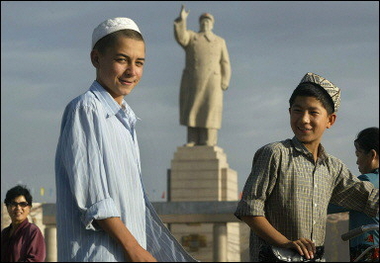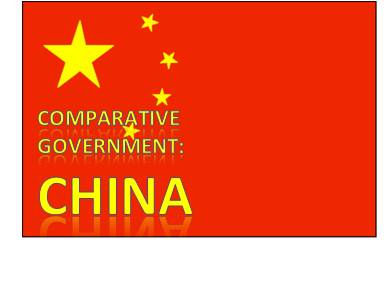Since July 2009, there have been ethnic riots and tension in China's Xianjiang region between the ethnic Uighurs and the overall Chinese majority group, the Han.
Who are the Uighurs? The BBC explains the long history of tension in a recent Q&A article (pasted below).
Who are the Uighurs?
The Uighurs are Muslims. Their language is related to Turkish and they regard themselves as culturally and ethnically close to Central Asian nations.
China maintains a high military presence in the Xinjiang region.
The region's economy has for centuries revolved around agriculture and trade, with towns such as Kashgar thriving as hubs along the famous Silk Road.
In the early part of the 20th Century, the Uighurs briefly declared independence. The region was brought under the complete control of communist China in 1949. Officially Xinjiang is now described by China as an autonomous region, like Tibet to its south.
What are China's concerns about the Uighurs?
Beijing says Uighur militants have been waging a violent campaign for an independent state by plotting bombings, sabotage and civic unrest.
Since the 9/11 attacks in the US, China has increasingly portrayed its Uighur separatists as auxiliaries of al-Qaeda.
It has accused them of receiving training and indoctrination from Islamist militants in neighbouring Afghanistan, although little public evidence has been produced in support of these claims.
More than 20 Uighurs were captured by the US military after its invasion of Afghanistan. Although they were imprisoned at Guantanamo Bay for six years, they were not charged with any offence and many have now been accepted for resettlement elsewhere.
What complaints have been made against the Chinese in Xinjiang?
Activists say the Uighurs' religious, commercial and cultural activities have been gradually curtailed by the Chinese state.
China is accused of intensifying its crackdown on the Uighurs after street protests in the 1990s - and again in the run-up to the Beijing Olympics.
Over the past decade, many prominent Uighurs have been imprisoned or have sought asylum abroad after being accused of terrorism.
China is said to have exaggerated the threat from Uighur separatists in order to justify repression in the region.
Beijing has also been accused of seeking to dilute Uighur influence by arranging the mass immigration of Han Chinese, the country's majority ethnic group, to Xinjiang.
The percentage of Han Chinese in the region has gradually been rising. Han currently account for roughly 40% of Xinjiang's population, while about 45% are Uighurs.
What is the current situation in Xinjiang?
Over the past decade, major development projects have brought prosperity to Xinjiang's big cities.
The activities of local and foreign journalists are closely monitored by the Chinese state and there are few independent sources of news from the region.
China has been keen to highlight improvements made to the region's economy while Uighurs interviewed by the press have avoided criticising Beijing.
However occasional attacks on Chinese targets suggest Uighur separatism remains a potent - and potentially violent - force.
Why did the July violence happen?
At least 150 people died in ethnic violence in July 2009 - and while officials say most of the dead were Han Chinese, Uighur groups deny this.
One of the sparks for the violence seems to have been the deaths of two Uighurs in clashes with Han Chinese at a factory in southern China in June.
On 5 July, Uighurs came out onto the streets of Urumqi to protest about these killings - but how and why these protests turned violent remains a contentious issue.
The authorities blame Xinjiang separatists based outside China for the unrest, and they have singled out exiled Uighur leader Rebiya Kadeer.
"Rebiya had phone conversations with people in China on 5 July in order to incite," Xinjiang Governor Nur Bekri said in a televised address.
But Rebiya Kadeer told the BBC she was not responsible for any of the violence.
"Last time during the Tibet riots, [the Chinese government] blamed the Dalai Lama, and now with the Xinjiang riot, they are blaming me," she said.
Uighur exiles say police fired indiscriminately on peaceful protests - adding that this was what led to the violence and deaths.
Source:
"Q&A: China and the Uighurs." BBC NEWS | News Front Page | Asia-Pacific. British Broadcasting Corporation, 8 July 2009. Web. 31 Jan. 2010. http://news.bbc.co.uk/2/hi/asia-pacific/7540636.stm.
Photo Source








No comments:
Post a Comment